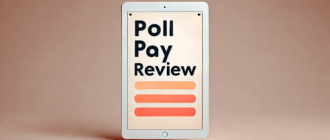In our digital age, earning money by expressing your opinion through online surveys seems like a simple and convenient way to get additional income. While this is a real opportunity for many, lurking in the shadows are scammers waiting for a chance to take advantage of careless users. Navigating the world of paid surveys requires understanding how to avoid common pitfalls, especially when it comes to ensuring the safety of your payments and data. Oh, those scammers, always trying to spoil our fun! But fear not, dear friends, old Selectemu is here to guide you through all the pitfalls.

- Common types of fraud on survey platforms
- Promises of Fabulous Rewards
- Phishing Survey Questions
- Upfront Payment for Access
- Identifying Safe Payment Methods
- Using secure online survey tools
- Transparent Payment Policy
- Verifying the Legitimacy of a Survey Platform
- Privacy Policy and Data Protection
- Independent Reviews and Ratings
- How to Protect Yourself
- Warning Signs to Watch Out For
Common types of fraud on survey platforms
In the jungle of the internet, where every click can lead to treasures or traps, a special kind of predator dwells – survey site scammers. Their bait? Mountains of gold for a couple of mouse clicks.
Promises of Fabulous Rewards
Imagine: you’re tired office plankton, lazily scrolling through your feed in search of a side hustle. And suddenly – bam! – a neon sign flashes before your eyes: “Earn $500 in 15 minutes! Just answer a few questions!”. Your heart starts beating faster, and images of a luxurious life are already forming in your head. Stop. Let’s slow down this train of fantasies and turn on common sense.
The reality is this: legitimate survey sites are not ATMs spitting out wads of cash for pressing a couple of buttons. They’re more like piggy banks into which you toss coins of your time and opinion. And yes, sometimes a bit more change falls out, but the jackpot is in the realm of fantasy.
Here’s how it works in the real world:
- “Micro-wallet”. Most surveys will bring you an amount comparable to the price of a cup of coffee – from $0.50 to $3. It won’t make you a millionaire, but it might pay for your Netflix;
- “Jackpot for the patient”: Occasionally, there are surveys that can bring in $10-$20. But they’re as rare as unicorns and usually require significant time and effort;
- “Marathon, not a sprint”. Consistency is the key to success. Regular participation in surveys can bring you an extra $50-$100 a month. Not a huge sum, but a nice bonus to your salary;
- “Specialized niches”. If you’re an expert in a certain field or fit specific demographic criteria, you can expect higher payouts. But even here, we’re talking about tens, not hundreds of dollars per survey.
I remember my first experience with “golden” offers. The site was screaming about the possibility of earning $1000 in a week just by answering questions. I was already mentally packing my bags for a vacation in Bali when my inner Sherlock Holmes began the investigation. It turned out that behind the glittering facade was a labyrinth of endless surveys, each bringing in pennies, and it would take years to reach the coveted amount. It was like chasing a carrot tied to a fishing rod in front of a donkey’s muzzle – seemingly close, but impossible to grab.
The moral of this fable is: if an offer sounds too good to be true, it probably isn’t true, but a skillfully set trap. Real survey platforms don’t promise mountains of gold. They offer a fair exchange: your opinion for a modest but real reward.
Phishing Survey Questions
Another serious red flag is when a survey platform requests sensitive financial information such as your bank account details, credit card numbers, or social security number. Reputable platforms don’t need this level of access for payment. Instead, they use secure, well-established payment systems such as PayPal, direct deposit, or gift cards.
As a rule, if a survey platform asks for too much personal or financial information, it’s likely a scam. Authoritative sources also emphasize that legitimate platforms will only request the bare minimum – usually just your email address and payment method.
Upfront Payment for Access
One of the most obvious signs of fraud is when a platform requires you to pay to join or access their surveys. Legitimate survey sites don’t require any upfront payments from you. Their business model is based on getting compensation from companies that want consumer feedback, not from the survey participants themselves.
I’ve seen many fraudulent schemes where users were asked to pay a membership fee or buy a “survey catalog” to access high-paying surveys. Don’t fall for this.
Identifying Safe Payment Methods
Ensuring the safety of your payments is crucial when interacting with paid survey platforms. How these platforms handle payments is often a reliable indicator of their legitimacy. By knowing which methods are safe and which practices to avoid, you can protect your earnings and personal information.
Using secure online survey tools
One of the most reassuring aspects of legitimate survey platforms is the use of well-known and secure payment methods. The most common options you’ll find are PayPal, prepaid cards, or electronic gift cards. These payment methods are trusted by users because they don’t require disclosure of sensitive financial data.
For example, when you sign up on a site that pays through PayPal, you only provide your PayPal email address – there’s no need to share your bank account or credit card information. Similarly, receiving an electronic gift card through a secure platform like Amazon or Visa reduces the risk of compromising your personal data.
Transparent Payment Policy
Transparency is key when it comes to survey platforms. A legitimate site will always have a clear and understandable payment policy. They will tell you how much you can expect to earn per survey, when you’ll be paid, and by what method. If the payment structure seems vague or overly complicated, it’s a warning sign.
One of the things I look for before joining any survey platform is their payment policy. Reputable platforms will detail everything you need to know about how payments are made – whether it’s after reaching a certain threshold or on a regular schedule.
Verifying the Legitimacy of a Survey Platform
Before investing your time and effort in a paid survey platform, it’s crucial to ensure that the site is legitimate. There are several ways to do this, and spending a few extra minutes checking can save you a lot of trouble in the long run.
Privacy Policy and Data Protection
A reliable platform will have a clear, detailed privacy policy that describes how your data is used and protected. This is especially important for survey sites because you often share personal information. Look for platforms that offer encryption and guarantee that your data won’t be shared with third parties without your consent.
It’s surprising how many people ignore the privacy policies of the sites they use. I always make it my rule to read it, especially when a site requires personal information. Legitimate survey platforms will emphasize their commitment to user privacy, explaining how they protect your data.
Independent Reviews and Ratings
One of the best ways to check a platform’s legitimacy is to look at reviews and ratings on third-party sites. Sites like Trustpilot, Better Business Bureau, and SurveyPolice offer user reviews of survey platforms, giving you insight into other people’s experiences.
I find these reviews invaluable when deciding whether to join a survey platform. By reading about other users’ real experiences, you can learn if the platform pays on time, how user-friendly it is, and if there are any hidden pitfalls. If a site consistently has low ratings or numerous complaints, it’s a clear sign that you should stay away from it.
How to Protect Yourself
When it comes to paid survey platforms, self-protection requires a bit of vigilance. By recognizing common scam tactics and taking steps to protect your personal information, you can safely navigate the world of online surveys.
Scammers often send unsolicited emails, SMS, or social media messages trying to lure you into participating in fraudulent surveys. I’ve lost count of how many times I’ve received random invitations to surveys from sites I’ve never registered with. To stay safe, only interact with platforms you’ve signed up for and avoid clicking on unsolicited links.
Legitimate survey platforms will never spam you with unsolicited requests. Instead, they will notify you of survey opportunities through proper channels, such as email newsletters, after you’ve subscribed.
Warning Signs to Watch Out For
There are several obvious signs that a survey platform might be fraudulent. Poorly designed websites, blurry logos, or overly generic URLs are serious warning signs. If a survey site seems hastily put together or lacks professional branding, it’s worth investigating further before sharing any personal information.
Additionally, be wary of surveys that push you to provide sensitive data or request personal information beyond what’s necessary for payment. Scammers often use fake testimonials or overly positive reviews to convince users that their platform is legitimate.






